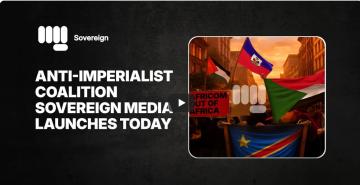Western media outlets, NGOs and powerful governments allied with the United States work in unison to deceive people about foreign policy.
“Never underestimate how convincing, formidable and dishonest the propaganda apparatus is that supports US imperialism.”
In this series, we ask acclaimed authors to answer five questions about their book. This week’s featured authors are Justin Podur and Joe Emersberger. Podur is Associate Professor at the Faculty of Environmental and Urban Change at York University. Emersberger is an engineer, writer, and activist based in Canada. Their book is Extraordinary Threat: The U.S. Empire, the Media, and Twenty Years of Coup Attempts in Venezuela.
Roberto Sirvent: How can your book help BAR readers understand the current political and social climate?
Justin Podur and Joe Emersberger: It’s a case study in how effectively seemingly diverse western media outlets, NGOs and powerful governments allied with the United States work in unison to deceive people about foreign policy. While focused on Venezuela, and US-backed efforts since 2002 to overthrow Chavista governments, the lessons learned generalize. We touch other US-backed coups in the twenty first century, for example, the 2004 coup that ousted Jean Bertrand Aristide, the 2019 that ousted Evo Morales, and the 2009 coup that ousted Manuel Zelaya. Since 2018 the US has also been trying to oust the democratically-elected government of Daniel Ortega in Nicaragua. In fact it has also declared Nicaragua an “extraordinary threat” to the US. So you can see that the US and its allies do not re-invent the wheel when it comes to trying to overthrow governments. And of course the outrageous hypocrisy of the imperial powers is something that must always be highlighted. We compare the US “aid stunt” when it pretended to force aid into Venezuela in 2019, to its support for the murderous Israeli siege on Palestinians that the US has supported for decades. Apologists for US crimes will scream “whataboutism” because they know that widespread awareness of imperial hypocrisy and double standards would be a huge problem for them.
What do you hope activists and community organizers will take away from reading your book?
Aside from what we already mentioned above, we hope they learn never to underestimate the need to be extremely careful in assessing governments that the US government vilifies; and to never underestimate how convincing, formidable and dishonest the propaganda apparatus is that supports US imperialism. Nobody can follow closely every country the US wants to destabilize. It’s not always easy to discern how big a kernel of truth there is, if any, to US allegations against a state it has singled out as an enemy. We hope people read our book and come away feeling more comfortable suspending judgment when they can’t look into such allegations closely: and, if they don’t choose to look into them, to try very hard to find independent sources. Moreover, we hope they realize that the allegations, even if true, can rarely justify war or the kinds of economic sanctions the US has imposed on Venezuela, which are essentially criminal acts of war.
We know readers will learn a lot from your book, but what do you hope readers will un-learn? In other words, is there a particular ideology you’re hoping to dismantle?
We hope readers will come away with much more skepticism of “left of center” outlets like the Guardian, as well as various high profile liberal NGOs that support western imperialism like Human Rights Watch and Amnesty International. We have a chapter devoted to the coverage provided by the Guardian’s Venezuela-based correspondent (Rory Carroll) from 2006-2012. These could be described at the “glory years” of Chavismo. US-backed coup attempts had been defeated and the government delivered rapidly reduced poverty and inequality; yet the Guardian’s coverage was overwhelmingly hostile and dishonest – usually through lies of omission. Similarly we show that Amnesty International and Human Rights Watch (especially) responded abysmally to the 2002 coup that briefly deposed Chavez. In more recent years, they have both whitewashed the lethal nature of US economic sanctions. In 2018, Amnesty told us directly that Trump’s sanctions (which it was easily to show were murderous) were not something Amnesty felt it would be “responsible” for it to comment on. At the same time, we asked Amnesty directly about Trump’s military threats against Venezuela and high profile US officials basically imploring the military to depose Maduro. Again, Amnesty said it had no comment on that. How can anyone trust an outfit like that?
Who are the intellectual heroes that inspire your work?
Books we regard as groundbreaking in debunking imperial propaganda are Manufacturing Consent by Ed Herman and Noam Chomsky; and Damming the Flood by Peter Hallward. We are also big fans of Media Lens in the UK. John Pilger actually deserves the overused term “legend” for work exposing western propaganda. We don’t offer a detailed structural analysis of western media the way Herman and Chomsky did: the five filters (ownership, advertising, sourcing, flak, and anti-communist ideology). We see it as common sense. It matters who pays the bills and signs the journalists’ checks. It matters that state and corporate officialdom can provide media with cheap and convenient access to sources. It matters that elites share a common worldview, and that a reward system will therefore be set in place that ensures journalists and editors who internalize elite assumptions most will tend to keep their jobs and get promoted. And it doesn’t have to work with one hundred percent perfection to be extremely effective. We’ve just seen AP fire a journalist accusing her of pro-Palestinian bias based on her activities as a student – and firing her just after the IDF blew up a building in Gaza where AP reporters worked.
In what way does your book help us imagine new worlds?
Chavismo is a strategy involving mass mobilization, constitutional reform, and elections to create a transition to socialism. It is clear enough that without the constant coup attempts and sanctions, Venezuela’s economy and political system would be far ahead of where it is now and an example for other countries in the hemisphere (Zelaya in Honduras was overthrown in 2009 for trying to use the same strategy).
By implication, our book shows that the democratization of mass media is key to any victory that can be won by anti-war, anti-imperial or generally progressive movements. Also, in order to address the way Venezuela has been smeared as a dictatorship, we ask people to recall the grave limitations on democracy in capitalist countries like the US and Canada. If you believe lies about yourself, it is easier to believe lies about others. The reason the mass media is insulated from the democratic process is because capitalist countries try to keep the democratic process out of the economy. Power over our lives is relegated by government to private sector tyrannies – whose abuses are abated to the extent unions are strong. A related problem we discuss a bit is that all countries require a professional class to do specialized work, and this class of workers is susceptible to internalizing the elitist assumptions of the most powerful people. This can happen even if that class of people is not doing great financially, or is even shrugging financially (like many journalists). So when these professional class people from rich countries go to report on the Global South, you not only have the professional class bias impacting their work but also the imperial bias that is sold to all of us by the mass media we consume. Imagining new worlds is only possible to the extent that we can free ourselves from imperial propaganda – we aim to help you clear away the cobwebs.
Roberto Sirvent is editor of the Black Agenda Report Book Forum.
COMMENTS?
Please join the conversation on Black Agenda Report's Facebook page at http://facebook.com/blackagendareport
Or, you can comment by emailing us at comments@blackagendareport.com



















